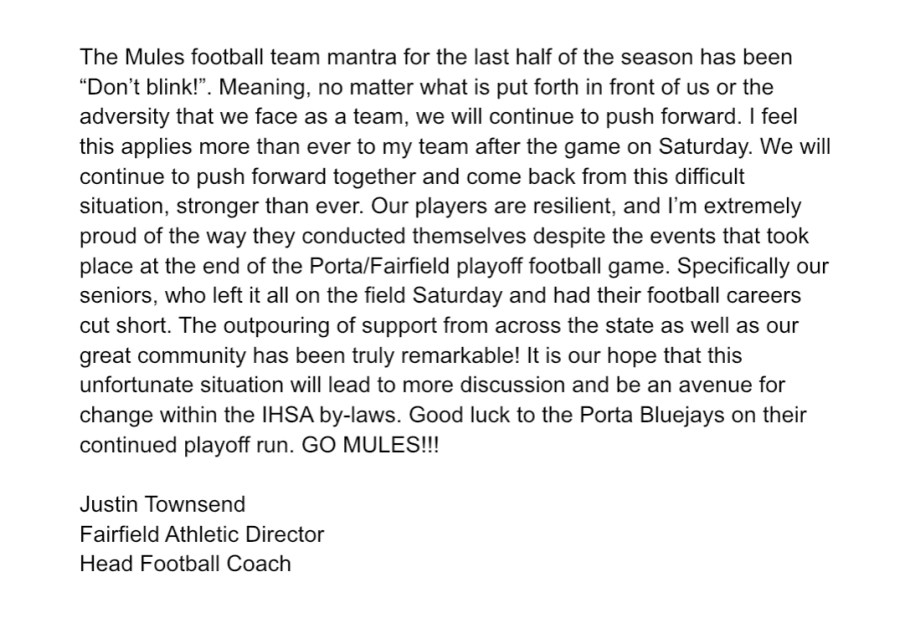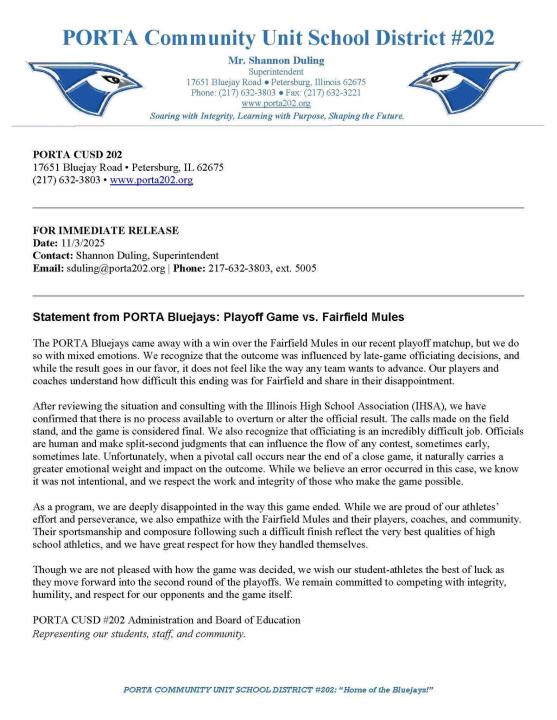High School Football’s Dark Side: A Controversial Call Ends a Season, Sparking Calls for Change in IHSA Rules Amidst Outrage and Division
The recent high school playoff game between Fairfield and PORTA has ignited a firestorm of debate, exposing the tension between officiating decisions and the integrity of competitive sports. The game, which concluded with a narrow 9-8 victory for PORTA, was marred by a controversial call that has left both teams and their supporters reeling. As the dust settles, what emerges is an urgent call for reform within the Illinois High School Association (IHSA) guidelines, spotlighting the struggles that players, coaches, and fans face when human error enters the fray.
In the closing moments of the game, with stakes at their highest, referees awarded PORTA an extra down, a decision that allowed them to advance the ball into field goal range. The resulting kick sealed the fate of the Fairfield Mules, abruptly ending their season and sparking immediate backlash from players, coaches, and fans alike. The controversy has spread across social media and local news outlets, as individuals voice their opinions on the fairness of the call and its lasting implications. The emotions surrounding this incident reflect a broader theme: the delicate balance between officiating authority and the expectations of fair play.
Fairfield’s head football coach and Athletic Director, Justin Townsend, issued a statement reflecting the resolve of his team despite the crushing defeat. “The Mules football team mantra for the last half of the season has been ‘Don’t blink!’” he stated, embodying a spirit of tenacity and resilience. However, his message also carried an undercurrent of frustration and disappointment regarding the officiating. Townsend’s call for a reevaluation of IHSA rules resonates with many who believe that the current framework allows for too much ambiguity and inconsistency, leading to game-altering decisions made in the heat of the moment.
The IHSA’s rules dictate that officials’ decisions are final and protests against these decisions are not subject to review. This aspect of high school sports governance is particularly contentious, as it effectively leaves teams powerless to challenge potentially game-changing calls. When players devote countless hours to training and competition, the notion that a single oversight can determine the outcome of a season raises significant ethical concerns. This situation not only affects the immediate stakeholders but also sends a troubling message to young athletes about accountability and justice in sports.
PORTA’s response to the controversy was equally poignant, with their officials acknowledging the impact of late-game officiating decisions on the match’s outcome. “While the results go in our favor, it does not feel like the way any team wants to advance,” their statement read. This sentiment transcends mere sportsmanship; it reflects a shared understanding of the emotional investment and hard work that go into every game from players on both sides. Such expressions of empathy remind us that beneath the rivalry lies a common bond among athletes, one that champions the spirit of fair competition.
The backdrop to this controversy is the long-standing debate within sports on how to handle officiating errors, particularly in high-stakes situations. Calls for technological assistance in the form of instant replay have gained momentum in various levels of sport, from the professional ranks to collegiate competitions. Advocates argue that technology can help rectify errors and uphold the integrity of the game. Yet, critics contend that introducing technology may disrupt the flow of the game and take away from the human element that defines sports. The balance between these perspectives becomes increasingly critical as leagues and associations evaluate their rules and practices.
In the wake of this incident, voices within the Illinois sports community are reflecting on a potential shift in policy to prevent similar situations from arising. The call for change echoes the sentiment that no player or team should have their season defined by a controversial call made in the waning seconds of a game. Each mistake serves as a reminder that officials, while trained, are still human and susceptible to error. However, the question remains: what mechanisms can be put in place to ensure fairness and accountability without compromising the essence of the game?
The landscape of high school football, like many sports, is often dotted with narratives of triumph and tragedy, underscoring the profound impact of collective experiences on young athletes. The fallout from the Fairfield and PORTA game encapsulates this reality, and it serves as a catalyst for a larger discussion about reform in high school athletics. As teams shift their focus to the next seasons, the memories of this controversial finish will undoubtedly linger, prompting both reflection and action amongst players, coaches, and officials alike.
Amidst the ongoing debates, it is essential to recognize that change often comes from the grassroots level, driven by those directly affected by the outcomes of these games. The voices of athletes, parents, and coaches are critical in shaping the future of high school sports, as they advocate for a system that values fairness and transparency. This incident could very well be a turning point for the IHSA, prompting the organization to revisit its protocols and consider how to better serve its member schools in maintaining the integrity of competition.
As the PORTA Blue Jays prepare for their next opponent, they carry with them not only the weight of victory but also the awareness of the circumstances surrounding their advancement. The upcoming matchup against Williamsville will be a test of their skills and resolve, but it will also serve as a poignant reminder of the fragility of success within the realm of high school sports.
For the Fairfield Mules, the focus now shifts to regrouping and preparing for the next season, armed with lessons learned from an experience that will not be easily forgotten. The mantra of “Don’t blink!” takes on new meaning, as they look to channel their disappointment into motivation for future endeavors. The collaboration and unity expressed in Townsend’s message embody the spirit of resilience that high school sports aim to instill in young athletes.
This incident is not just a moment in time; it is part of a larger narrative that reflects the complexities of competition, the pressures of performance, and the imperative for continued dialogue surrounding officiating protocols in sports. The call for change from both schools highlights the necessity for transparency and fairness, ensuring that the essence of athletic competition remains intact for future generations of players. As discussions unfold, the hope is that the lessons learned from this controversial finish will lead to meaningful reforms that protect the integrity of high school sports.

HENDERSON, Ky. (WEHT) — After a controversial 9-8 Illinois high school opening round playoff game between Fairfield and PORTA, both schools release statements to call for change among the IHSA rules.
During the closing seconds of the game this past Saturday, the referees awarded the Blue Jays an additional down that was used to kick a field goal to win the game and end the Mules’ season.
Fairfield’s head football coach and Athletic Director, Justin Townsend denied a request to appear on camera, but released a statement saying, “The Mules football team mantra for the last half of the season has been “Don’t blink!”. Meaning, no matter what is put forth in front of us or the adversity that we face as a team, we will continue to push forward. I feel this applies more than ever to my team after the game on Saturday. We will continue to push forward together and come back from this difficult situation, stronger than ever.”
Townsend then called for change, so that no team ever has to suffer this fate once again.
“It is our hope that this unfortunate situation will lead to more discussion and be an avenue for change within the IHSA by-laws. Good luck to the PORTA Bluejays on their continued playoff run.”

The rules state “the decisions of game officials shall be final; protests against the decision of a game official shall not be reviewed by the Board of Directors.” PORTA later issued their own statement to share their condolences to the Mules.
“We recognize that the outcome was influenced by late-game officiating decisions, and while the results goes in our favor, it does not feel like the way any team wants to advance. Our players and coaches understand how difficult this ending was for Fairfield and share in their disappointment.”

In a statement made by IHSA Executive Director Craig Anderson on Sunday he said, “I recognize that there will be calls for the game results to be changed, or for PORTA to forfeit, but neither option is a possibility within the IHSA by-law structure.”
Fairfield’s season finished at (6-4) overall. While the Bluejays will face Williamsville in the second round Friday, November 8th.
Copyright 2025 Nexstar Media, Inc. All rights reserved. This material may not be published, broadcast, rewritten, or redistributed.
For the latest news, weather, sports, and streaming video, head to Eyewitness News (WEHT/WTVW).
